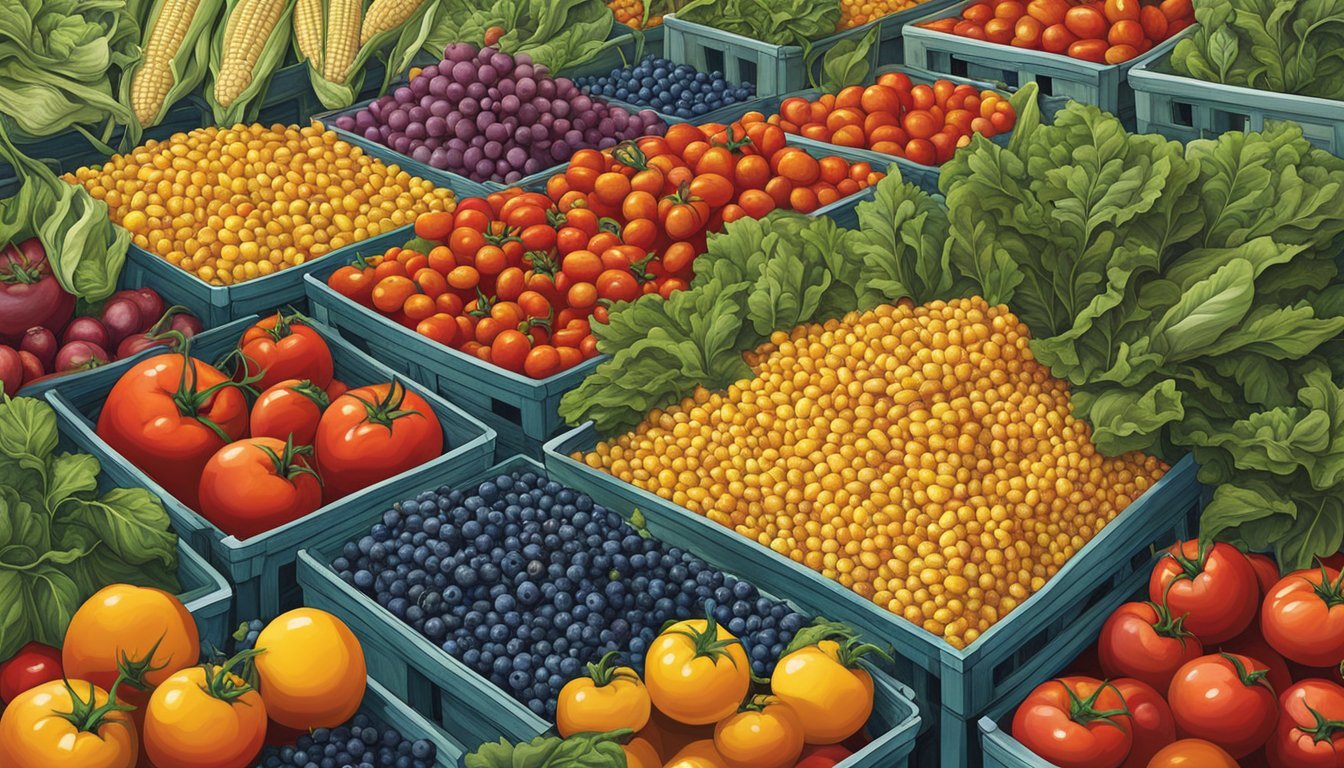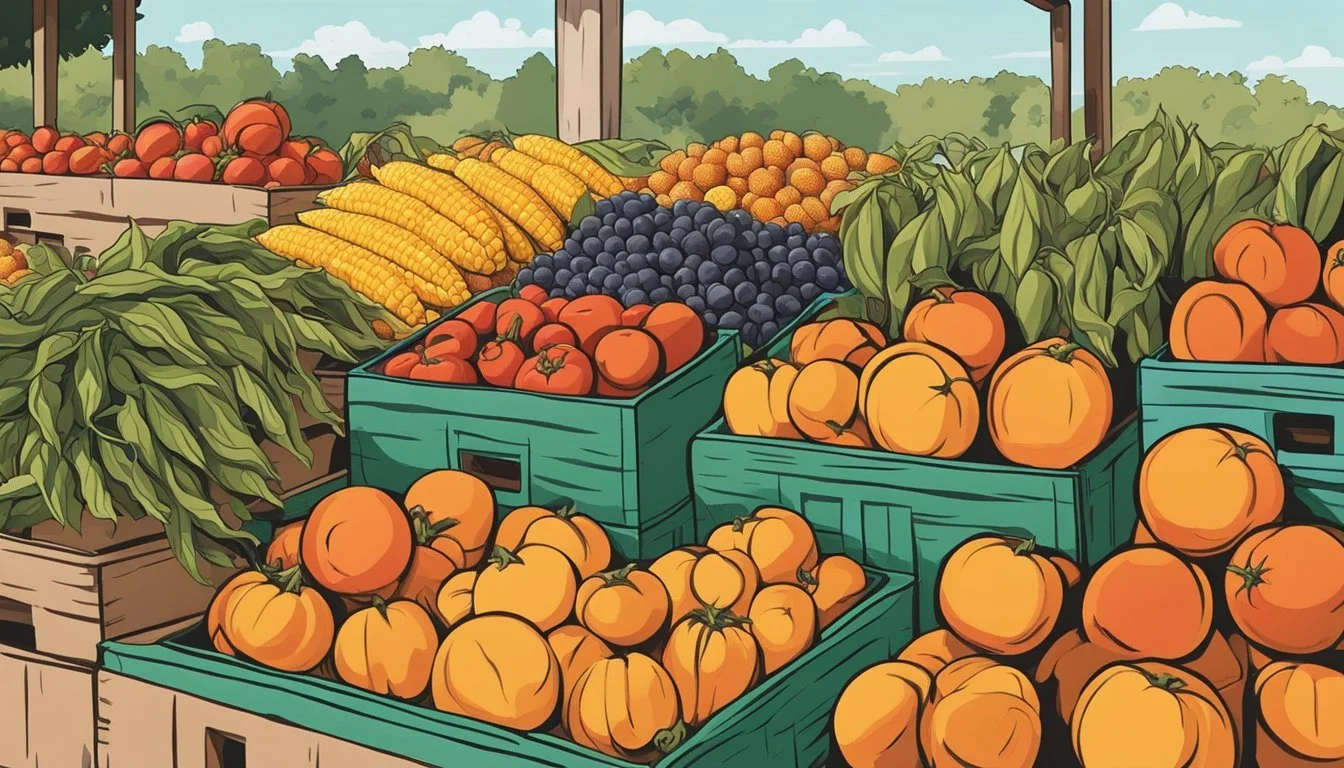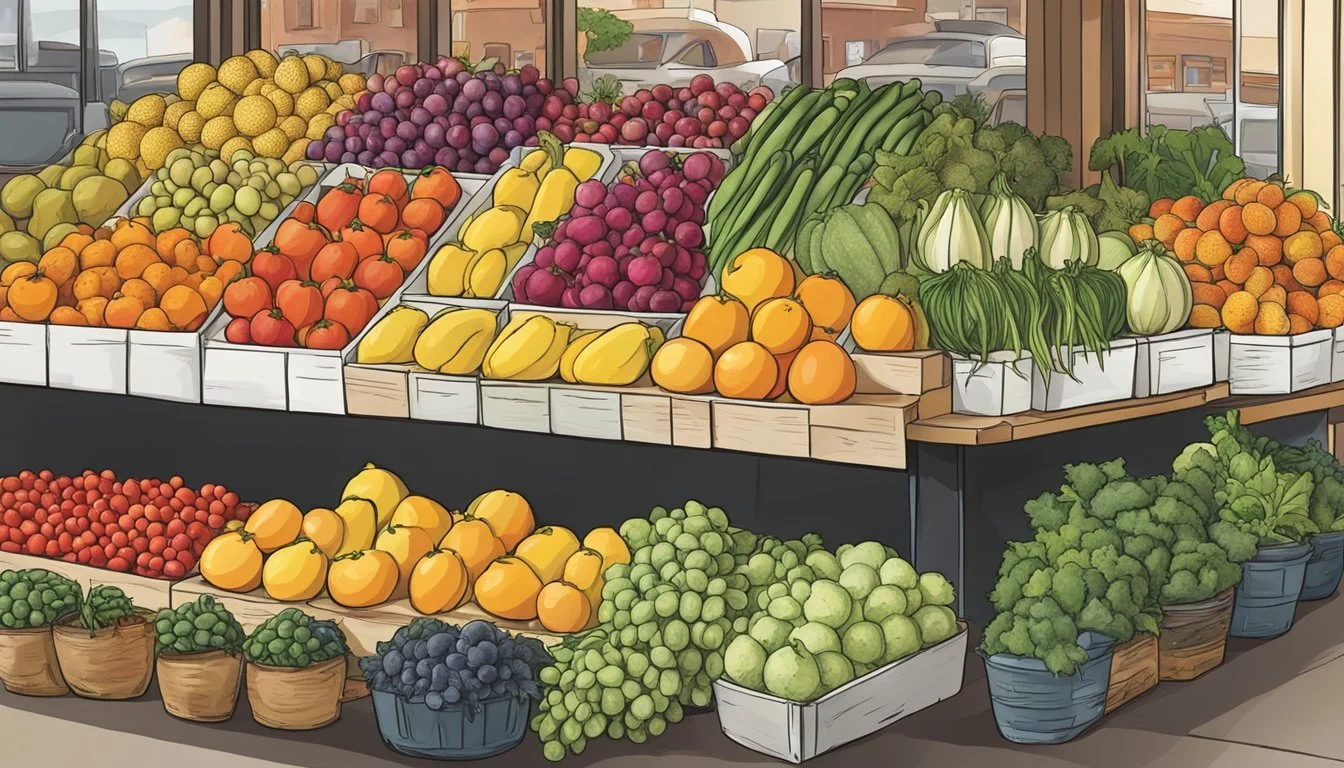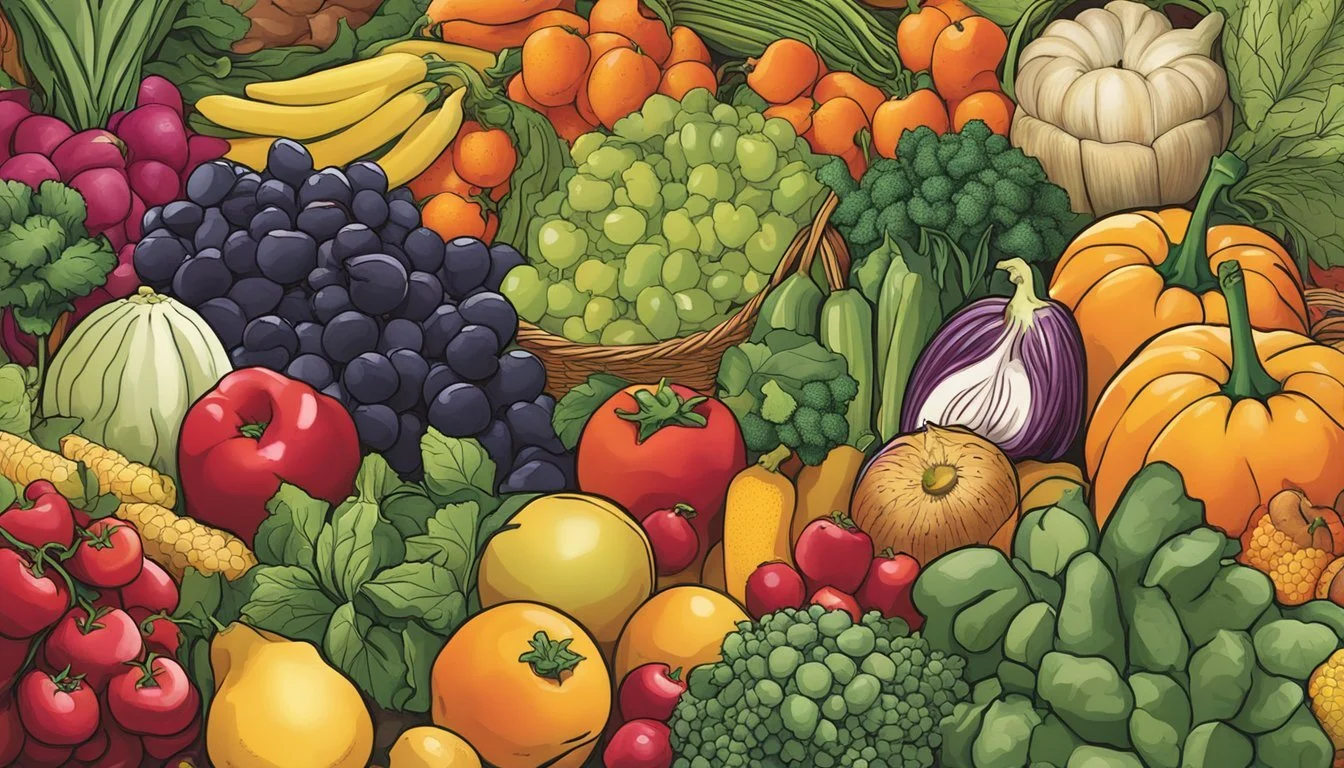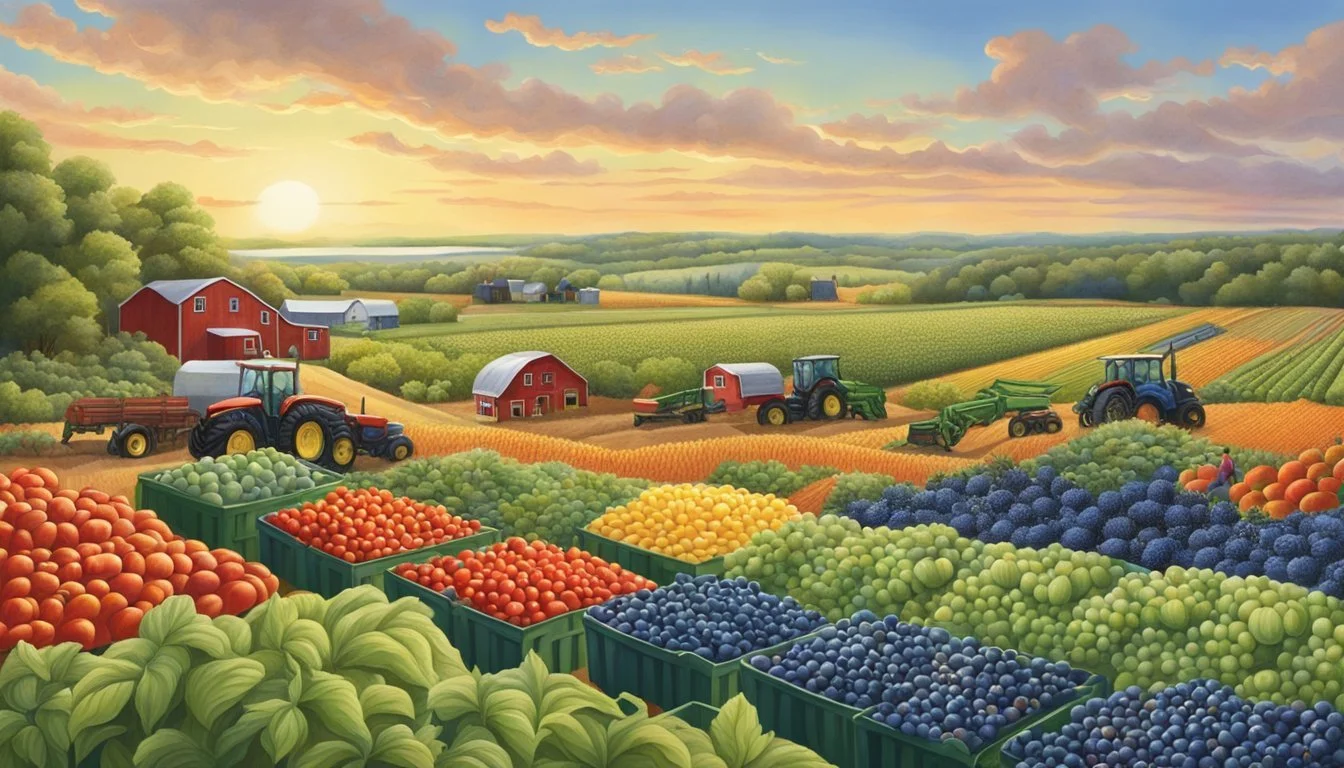New Jersey Seasonal Fruit & Vegetables in September
A Guide to Autumn Harvests
This Article is Part of our New Jersey Seasonal Fruit & Veg Calendar
As the summer heat begins to wane in September, New Jersey's agricultural offerings shift to provide an array of fruits and vegetables that capture the essence of fall's approach. This change in season is an excellent opportunity for local consumers and businesses alike to take advantage of the Garden State's rich and diverse produce. New Jersey's farms are known for their high-quality seasonal harvests which, in September, includes a variety of both the last sweet tastes of summer and the first hearty flavors of autumn.
The selection of fruits in New Jersey during September is characterized by late summer berries and the beginning of the fall apple varieties. Blueberries and blackberries are wrapping up their season, offering a final burst of sweetness, while apples (how long do apples last?) signal the start of their fruitful abundance. Meanwhile, vegetables such as sweet peppers, eggplant (What wine goes well with eggplant?), and tomatoes (What wine goes well with tomatoes?) are at their peak, providing a colorful and flavorful bounty for countless recipes.
Moreover, September marks the arrival of certain cool-weather crops in New Jersey. Brussels sprouts, broccoli (how long does broccoli last?), and cabbages make their debut, suggesting a move toward more robust and warming dishes. The seasonal transition that September brings allows for a fusion of flavors that can cater to a variety of palates and culinary preferences, all while supporting local agriculture and sustainability.
The Importance of Seasonal Eating
Eating with the seasons is a practice that can lead to numerous health and environmental benefits. In New Jersey, as fall approaches, a shift in available fruits and vegetables offers a palette of flavors ranging from sweet to tart. Seasonal eating encourages diversity in one's diet, an aspect widely recognized for its nutritional advantages.
Incorporating seasonal produce like September's apples or sweet potatoes can provide the body with a broader spectrum of vitamins and minerals than relying on the same produce year-round. This diversity can enhance overall health, supporting the body's needs as they change with the seasons.
The environment also benefits from seasonal consumption. By choosing local, seasonal foods, the demand for off-season produce, which often involves extensive transportation and storage, reduces. Consequently, this can diminish associated carbon footprints and resource usage.
Fruits: Apples (sweet to tart), Pears
Vegetables: Squash, Cauliflower, Broccoli
Eating seasonally means that fruits and vegetables are often picked at their peak of ripeness. Not only does this impact the flavor—giving us that sweet burst from a perfectly ripe pear or the robust tart flavor from a cranberry—but it is also when their nutrient content is highest.
By incorporating seasonal eating habits, individuals can embrace the natural cycle of growth and harvest, leading to a harmonious relationship with nature and a more balanced diet. As fall's cool embrace settles over New Jersey, residents have the opportunity to nourish themselves with the best of what the season has to offer, both in taste and nutrition.
New Jersey’s Climatic Influence on Agriculture
New Jersey's climate exerts a significant influence on the state's agricultural outputs, particularly in the transition from summer to fall. September brings a cooling of the summer heat, allowing for the successful growth of a variety of fruits and vegetables. However, the state's experience with climate change introduces challenges such as unpredictable weather patterns, which can include droughts, heat waves, and excessive rains.
Climate variations between the northern and southern parts of the state result in diverse growing conditions. In the southern regions, milder weather extends the growing season, while the northern parts may face an earlier onset of fall temperatures.
Fall's arrival impacts when and what crops are planted and harvested. For example, certain varieties of apples and late-season peaches are harvested, benefiting from the cooler temperatures that trigger the natural ripening process.
The state's agriculture is adapted to these conditions, as seen in its production of crops like:
Blueberries
Cranberries
Tomatoes
Bell peppers
These crops are meticulously planned and cultivated to coincide with New Jersey's climatic phases. Seasonal changes are especially relevant for crops like spinach and squash, which are sensitive to temperature fluctuations.
New Jersey's robust nursery, greenhouse, and sod industry also adapts to climate norms, with many plants entering key growth phases in early fall. The state's agricultural stakeholders, including organizations like the NJ Farm Bureau and institutions such as Rutgers Cooperative Extension, work to mitigate climate impacts and sustain farm productivity.
In summary, New Jersey's climate, with its season-specific variations, plays a pivotal role in shaping the agricultural landscape, especially in the period of September where summer transitions to fall.
September Fruit Harvest in New Jersey
In September, New Jersey offers an abundance of fresh fruit, ripe and ready for harvesting. This period marks a transition with the last of summer's offerings and the beginning of fall's bounty.
Berries and Small Fruits
While the berry season is winding down, September still presents opportunities for late varieties of these small fruits. One can find remnants of summer's harvest:
Blackberries: These are often at the tail end of their availability, as the season typically concludes in early September.
Tree Fruits
The harvest of tree fruits is at its peak in September, with many orchards bustling with activity. The specific fruits available include:
Apples: A staple of the fall season, various apple varieties reach their peak ripeness in September.
Pears: These become ready to pick in September, offering a sweet, delicate flavor.
Plums: With a shorter season, some plum varieties are still available early in the month.
Each of these fruits serves as a testament to New Jersey's rich agricultural landscape, promising freshness and flavor for consumers and local markets alike.
September Vegetable Harvest in New Jersey
During September, New Jersey's agriculture presents a rich variety of vegetables ready for harvest. Gardeners and consumers alike will find an abundance of root vegetables and squashes, alongside leafy greens and a selection of herbs, at the peak of their flavor and nutritional value.
Root Vegetables and Squashes
In September, root vegetables such as beets are in full swing, offering their earthy sweetness to the New Jersey palette. They are accompanied by a family of squashes, including varieties like butternut, acorn, and spaghetti squash. These vegetables not only add depth to autumnal dishes but also store well for winter use.
Beets: Ready for harvest, offering deep reds and golden hues.
Winter Squash: A variety of squashes become available:
Butternut Squash: (how long does butternut squash last?) Creamy and versatile in recipes.
Acorn Squash: Distinctive for its ridged skin and sweet flesh.
Spaghetti Squash: Unique for its stringy, pasta-like interior.
Leafy Greens and Herbs
The cooler temperatures in September also encourage a surge in the growth of kale—a robust leafy green known for its nutritional benefits and culinary flexibility. It thrives alongside a medley of herbs that reach their aromatic peak during this month.
Kale: Offered in multiple varieties, each packed with healthful nutrients.
Herbs: A bounty of fresh herbs is ready for harvest, often including:
Basil: (how long does basil last?) Still available early in the month before the first frost.
Parsley: A culinary staple found fresh in gardens and markets.
Cilantro: Cooler temperatures enhance its growth and flavor profile.
New Jersey's September harvest allows for a diverse range of fresh produce, reflective of the changing seasons and the state's rich agricultural offerings.
Organic and Local Options
New Jersey is rich with opportunities for securing organic and local produce in September. Shoppers have the ability to choose from various farms and farmers' markets that emphasize organic practices, ensuring access to fresh, seasonal, and sustainably-grown fruits and vegetables.
Organic Farms
New Jersey boasts numerous organic farms specializing in a variety of produce. Jeff's Organic Produce for instance, takes pride in offering freshly harvested greens, tomatoes, roots, potatoes, and melons, catering to customer requests for specific organically-grown crops. Flocktown Farm, located in Pittstown, NJ, also emerges as a notable Certified Organic farm, providing residents of North and Central NJ, as well as areas like Staten Island and Bucks County, with ecologically friendly fruits and vegetables.
Farmers' Markets
Farmers' markets throughout New Jersey serve as a hub for local, organic produce. One can typically find the famed Jersey tomatoes and sweet corn, as these products are particularly distinguished when purchased from local sources during their peak season. These markets not only support local agriculture but also allow consumers access to some of the freshest seasonal items available. Consumers should note that while the availability of specific crops may vary, a trip to their local farmers' market in September should yield a bountiful selection of quality organic produce.
Choosing and Storing Your Produce
When selecting sweet corn, one should look for ears with green husks and slightly sticky tassels. These indicate freshness.
How to Choose How to Store Sweet Corn Ears with snugly fitting husks and milky silk ends. Refrigerate unhusked, consume within 1-2 days for best taste.
Corn should be eaten as soon as possible after purchase to enjoy its full sweetness, as it begins to lose its sugar content once harvested. Sweet corn is typically consumed raw or cooked and is best when it’s fresh.
For vegetables like cabbage and broccoli, which are also available in September, firmness and vibrant color signify prime quality.
How to Choose How to Store Cabbage Select heads that feel heavy for their size. Keep refrigerated, tightly wrapped, and use within 2 weeks. Broccoli Look for firm, dark green florets. Store in the refrigerator, in a perforated bag, for up to 5 days.
Storage tips: Vegetables should be stored in the crisper drawer of the fridge. This compartment provides an ideal environment that can help maintain freshness and extend shelf life. If produce is pre-cut or peeled, store it in sealed containers or plastic bags.
The user should always ensure their produce is dry before refrigeration, as excess moisture can promote spoilage.
September Recipes Featuring New Jersey Produce
In New Jersey, September is a bountiful month, offering up a variety of fresh produce perfect for the start of fall cooking. Many fruits and vegetables are at their peak, presenting an ideal opportunity for farm-to-table meals.
Vegetables:
Tomatoes: They remain ripe and ready for harvest. Utilize them in a roasted tomato soup or a classic BLT sandwich.
Eggplant: This versatile vegetable can be turned into a flavorful eggplant parmesan or baba ghanoush.
Corn: Fresh corn can be the star in corn chowder or a simple, yet delicious, corn on the cob.
Fruits:
Apples: A New Jersey favorite, apples are perfect for apple pie, crisps, or a fresh salad.
Grapes: Incorporate them into a chicken salad for a pop of sweetness.
Herbs:
Basil: Still fresh in September, basil can complement tomatoes beautifully in a Caprese salad (What wine goes well with caprese salad?) or be blended into a pesto.
Recipe Key September Produce Roasted Tomato Soup Tomatoes, Basil Eggplant Parmesan Eggplant, Tomatoes Corn Chowder Corn, Potatoes Apple Crisp Apples Chicken Salad with Grapes Grapes, Apples
They should also embrace heartier dishes that transition into the cooler weather. Utilizing New Jersey's September produce not only supports local agriculture but also ensures the freshest ingredients are used, enhancing the flavor and nutritional value of each meal.
Food Festivals and Events
In September, New Jersey's communities come together to celebrate the bounty of the season with a variety of food festivals and events. These gatherings are an embodiment of the Garden State's rich agricultural heritage and its penchant for culinary festivities.
Bergen County Food & Wine Festival. This event typically brings together a mix of gourmet food, wines, and community spirit in a celebration of the season's harvest. Attendees enjoy the tastes of local chefs and vintners against the backdrop of the approaching fall.
Glassboro Car Show & Food Truck Festival. A particular delight for car enthusiasts and foodies alike, where one can marvel at classic and modern automobiles while enjoying diverse culinary offerings from a fleet of food trucks.
Tomato Festival. This festival honors New Jersey's tomato harvest in August, offering an array of dishes that feature the state's famous fruit. It takes a place at the Cooper River Park, showcasing everything from traditional dishes to more innovative tomato creations.
September Culinary Highlights Location Event Date Tomato Festival Cooper River Park August (annual) Food & Wine Festival Bergen County September 7 and 10 Car Show & Food Truck Festival Glassboro, New Jersey September 1
Each event showcases the versatility of September's harvest and New Jersey's food scene while providing an opportunity for locals and visitors to engage with the heartbeat of the state's community-centered celebrations.
Agricultural Impact on New Jersey Economy
Agriculture plays a fundamental role in New Jersey's economy. Often called "The Garden State," New Jersey benefits significantly from a variety of crops, including fruits and vegetables that are harvested throughout different seasons. The industry contributes to both the employment sector and the gross domestic product (GDP) of the state.
Key Statistics:
New Jersey farmers cultivate over 100 varieties of fruits and vegetables.
The state's agricultural products are a cornerstone for both domestic consumption and export, driving economic growth.
Some of New Jersey's top commodities by sales include fruits, vegetables, and dairy products.
In particular, counties like Cumberland, Atlantic, and Gloucester are notable for their agricultural outputs. The following are some top-ranking counties in agricultural sales:
Cumberland County: Leads in total commodity sales.
Atlantic County: Holds the second position in total commodity sales.
Gloucester County: Currently, the third-largest contributor.
These regions contribute to New Jersey's reputation for high-quality produce. The seasonal availability of a wide range of produce not only meets local consumption demands but also attracts external markets. Agriculture also generates capital through the harmonious relationship between research institutions such as Rutgers Cooperative Extension and government-funded programs, optimizing crop yields and ensuring sustainable farming practices.
In summary, the agricultural sector is a strong pillar of New Jersey's economy, providing substantial revenue, supporting the state's workforce, and enhancing the overall economic stability. It reflects a legacy of farming excellence and adaptation to consumer needs, reinforcing the state's status within the national agricultural landscape.

